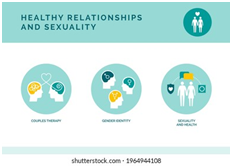DOES NUTRITION RECOMMENDATIONS NEED TO BE GENDER-SPECIFIC? HOW DOES EMOTIONAL EATING EFFECT OBESITY MORE IN WOMEN THAN IN MEN?
his study, which was just published in the journal Brain Communication, evaluated the differences between males and females with high body mass index (BMI) compared to those with a normal BMI by analysing several types of brain scans along with other clinical data. Obese women showed abnormalities in emotion-related brain areas that were connected to greater levels of compulsive eating, according to research. In contrast, the stomach and visceral feelings connected to abdominal pain and hunger were the sources of the hunger pangs in obese males. Even though the study focused on the variations in brain functions associated with obesity in men and women, it is important to take into account other possible causes of emotional eating in Indian women. Indian women's emotional eating habits are significantly shaped by culture, societal expectations, and gender. When problems with family dynamics, interpersonal connections, or work-life balance arise, both men and women turn to emotional eating as a coping technique. Women encounter more of these pressures because they have a disproportionately higher part of the duties in their personal and family lives than males. Additionally, the stigma associated with actively seeking treatment for mental health-related conditions like depression or anxiety contributes to underdiagnosis or undertreatment, which causes emotional eating,
of social media, sedentary
lifestyles, and more exposure to Western fast food culture might all worsen
emotional eating patterns. These findings may be useful in treating obesity at
its earliest stages if comparable results are found in subsequent research
using bigger and more genetically varied groups. Based on this observational
data, medical experts in the fields of gynaecology, neurology, endocrinology,
and nutrition could choose to treat their patients differently.
The focus of future studies should be on more accurate obesity assessments and an investigation of the main
factors that contribute to male obesity. As obesity continues to be a serious
global health issue, ", applying these discoveries to
clinical practice may improve the effectiveness of therapies and foster better
long-term results for patients. Therefore, don't be afraid to ask about a
customised treatment plan that takes into account your particular needs and
integrates the most recent scientific findings when you next have a meeting
with a healthcare provider regarding weight management.
Additionally, BMI is not a
reliable indicator of health. Doctors argue that to provide more
accurate results, the study should have taken into account more precise
measures of obesity, such as visceral adiposity or waist-hip ratio.
To learn more about how
obesity presents differently in the brains of men and women, the researchers
employed multimodal brain imaging (structure, connectivity, and function) using
a data-driven methodology. Medicine, "We know that brain signatures are
altered for obese individuals as they have implications for how one views food
and how this in turn leads to food cravings, altered eating patterns, and
ultimately obesity. However, examining how these brain patterns differ between
the sexes is a game-changer because it implies that the pathways by which men
and women develop obesity are distinct.
For people to adopt a
healthy, balanced diet that satisfies their nutritional demands, nutrition
advice is crucial. The necessity for gender-specific nutrition guidelines vs
whether a general approach to nutrition is preferable is still up for debate.
Men and women have varied
nutritional needs because of their distinctive biological distinctions, which
is one justification for recommending gender-specific diets. Men often need
more protein than women because of their larger muscular mass, whereas women
typically need more iron to account for monthly blood loss.
Therefore, making sure that
both men and women get the nutrients they need to sustain good health may be
easier with gender-specific guidelines.
However, some contend that recommendations based on gender reinforce gender stereotypes and overlook the unique characteristics that each gender possesses. For example, not all women have periods, and not all males have a lot of muscle.
The complexity of the issue
of whether nutrition advice should be gender-specific ultimately depends on several variables, such as the degree of individual diversity within each
gender and the accessibility of funding for research and development. Though it is critical to take into account the
various nutritional demands of different people and to advance an inclusive
philosophy of nutrition that meets the diverse needs of everyone, regardless of
gender identification. We can make sure that everyone gets access to the
nutrients they require to maintain their best possible health and well-being by
doing this.









Comments
Post a Comment